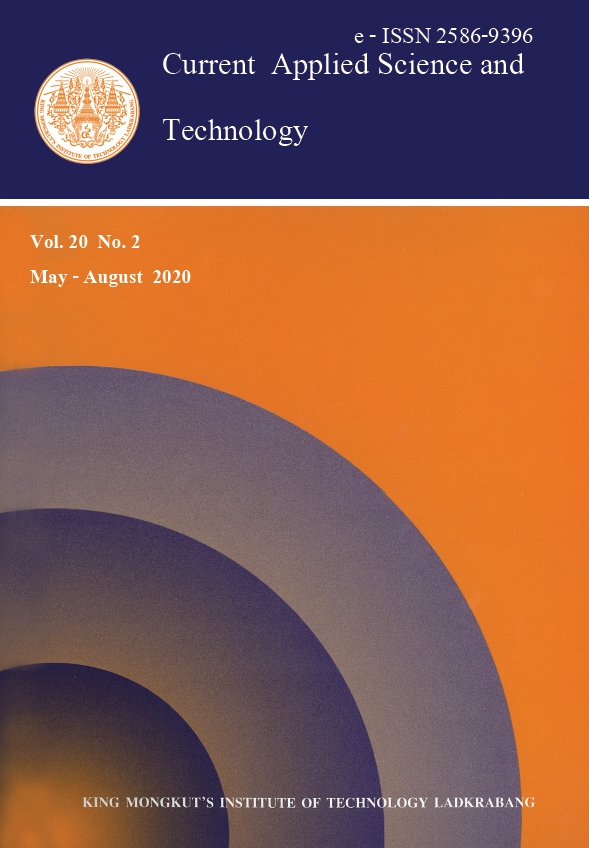Dynamic Maintenance Scheduling with Fuzzy Data via Biogeography-based Optimization Algorithm and its Hybridizations
Main Article Content
Abstract
A multi-objective maintenance problem of a plaza building is presented using a dynamic fuzzy maintenance scheduling model (DFMS). There are multiple component machines and jobs with different fuzzy processing time. Generally, it aims to simultaneously minimize total labor cost on regular, overtime and subcontract including equipment cost and minimize the makespan of all jobs, teams and consecutive time periods under fuzzy natures. Nature-inspired intelligence algorithms have become increasingly popular to implement complex problems. Some features of biogeography-based optimization algorithm (BBO) are unique among biology-based methods. This study applied the BBO and its hybridizations based on the variable neighborhood search (BBOVNS) and particle swarm optimization (BBOPSO) mechanisms to the DFMS. Analytical findings indicated that the proposed BBOPVNS is powerful in terms of dispersion effects. The proposed DFMS demonstrates an efficient compromise method and the overall levels of decision making satisfaction with the multi-objective problem.
Keywords: dynamic maintenance; fuzzy data; metaheuristic; biogeography-based optimization; variable neighborhood search; particle swarm optimization
*Corresponding author: Tel.: +66 25 87 4336 Fax: +66 25 87 4336
E-mail: pasurachacha@hotmail.com
Article Details
Copyright Transfer Statement
The copyright of this article is transferred to Current Applied Science and Technology journal with effect if and when the article is accepted for publication. The copyright transfer covers the exclusive right to reproduce and distribute the article, including reprints, translations, photographic reproductions, electronic form (offline, online) or any other reproductions of similar nature.
The author warrants that this contribution is original and that he/she has full power to make this grant. The author signs for and accepts responsibility for releasing this material on behalf of any and all co-authors.
Here is the link for download: Copyright transfer form.pdf
References
[2] Aliev, R., Fazlollahi, B., Guirimov, B. and Rashad R.A., 2007. Fuzzy-genetic approach to aggregate production–distribution planning in supply chain management. Information Sciences, 177, 4241– 4255.
[3] Zimmermann, H.J., 1996. Fuzzy Set Theory and Its Application. 3rd ed. Massachusetts: Kluwer Academic Publisher.
[4] Zimmermann, H.J., 1985. Applications of fuzzy sets theory to mathematical programming. Information Science, 35, 29-58.
[5] Zimmermann, H.J., 1976. Description and optimisation of fuzzy systems. International Journal of General Systems, 2, 209–215.
[6] Zimmermann, H.J., 1978. Fuzzy programming and linear programming with several objective functions. Fuzzy Sets and Systems, 1, 45–56.
[7] Aungkulanon, P., Phruksaphanrat B. and Luangpaiboon, P., 2012. Harmony search algorithm with various evolutionary elements for fuzzy aggregate production planning. Intelligent Control and Innovative Computing, 189-201.
[8] Simon, D., 2008. Biogeography-based optimization. IEEE Transactions on Evolutionary Computation, 12(6), 702–713.
[9] Ma, H. and Simon, D., 2011. Blended biogeography-based optimization for constrained optimization. Engineering Applications of Artificial Intelligence, 24(3), 517–525.
[10] Ma, H. and Simon, D., 2017. Evolutionary Computation with Biogeography-Based Optimization, John Wiley & Sons, Hoboken, NJ, USA.
[11] Khademi, G., Mohammadi, H. and Simon, D., 2017. Hybrid invasive weed/biogeography-based optimization. Engineering Applications of Artificial Intelligence, 64, 213–231.
[12] Ergezer, M., Simon, D. and Du, D., 2009. Oppositional biogeography-based optimization. in Proceedings of the IEEE International Conference on Systems, Man and Cybernetics, San Antonio, TX, USA, October 2009, 1009–1014.
[13] Simon, D., Ergezer, M., Du, D.D. and Rarick, R., 2011. Markov models for biogeography-based optimization. IEEE Transactions on Systems, Man, and Cybernetics, Part B (Cybernetics), 41(1), 299–306.
[14] Ma, H., Simon, D. and Fei, M., 2016. Statistical mechanics approximation of biogeography-based optimization. Evolutionary Computation, 24(3), 427–458.
[15] Ma, H., Simon, D., Siarry, P., Yang, Z. and Fei, M., 2017. Biogeography-based optimization: a 10-year review. IEEE Transactions on Emerging Topics in Computational Intelligence, 1(5), 391–407.
[16] Cui, M., Li, L. and Shi, M., 2019. A selective biogeography-based optimizer considering resource allocation for large-scale global optimization. Computational Intelligence and Neuroscience, 2019, Article ID 1240162, 17 pages
[17] Hansen, P. and Mladenovic, N., 2001. Variable neighborhood search: principles and applications. European Journal of Operational Research, 130, 449–467.
[18] Hansen, P. and Mladenovic, N., 2001. J-means: A new local search heuristic for minimum sum-of-squares clustering. Pattern Recognition, 34, 405–413.
[19] Kennedy, J. and Eberhart, R. 1995. Particle swarm optimization. In Proceedings of IEEE International Conference on Neural Networks, pp. 1942–1948.
[20] Shi, Y. and Eberhart, R.C., 1999. Empirical study of particle swarm optimization. In Proceedings of the 1999 Congress of Evolutionary Computation, vol. 3, IEEE Press, New York, 1945–1950.


